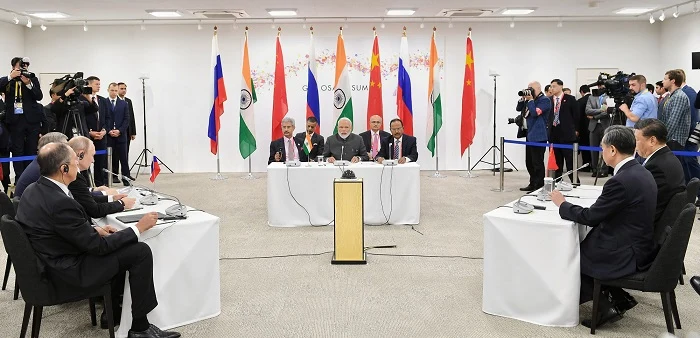Russia plans to expand interaction with India on various regional and international issues of importance, not only at the bilateral level but also through various multilateral and plurilateral forums in 2022.
Moscow, sources tell IndiaNarrative.com, is especially keen on increasing cooperation with its partners New Delhi and Beijing through the RIC (Russia-India-China) format in the region, hoping to break ice between the two neighbours in the process.
The matter also came up for discussion during the first phone call of the year between External Affairs Minister S Jaishankar and Russian Foreign Minister Sergey Lavrov on Tuesday.
Both ministers discussed extensively the "practical issues of bilateral cooperation" in developing the results of the Indian-Russia Summit held in New Delhi last month.
Jaishankar and Lavrov, according to the Russian Foreign Ministry, exchanged views on enhancing communication on regional and international affairs, including working together in the SCO, BRICS, RIC, as well as in the UN and its Security Council.
India has expressed its continued commitment to foster closer dialogue and cooperation among the three largest nations in the Eurasian region under the RIC mechanism.
However, New Delhi has also made it clear to Moscow that any future cooperation with Beijing, especially through the RIC trilateral, would majorly depend on China's complete disengagement from all the friction points along the Line of Actual Control (LAC) in Eastern Ladakh in accordance with the existing bilateral agreements and protocols.
It is believed that Prime Minister Narendra Modi had conveyed the same to Russian President Vladimir Putin during his visit to the Indian capital on December 6.
Putin then discussed the matter with Chinese President Xi Jinping during a virtual meeting on December 15.
After the hour and a half conversation between the two Presidents, Putin's top aide Yury Ushakov told the media in Moscow that the heads of state have planned to hold "in the near future" a Russia-India-China meeting.
"Putin informed Xi Jinping about the visit to New Delhi on December 6… The topic of cooperation in the Russia-India-China format was addressed and the leaders agreed to continue exchanging opinions in this regard and to endeavour to hold the next summit within the RIC framework in the near future," said Ushakov.
Five days later, the Russian President dialled PM Modi as both leaders "followed up on some of the issues" discussed during Putin's visit to India.
"The leaders agreed to remain in regular touch on all aspects covered under the India-Russia Special and Privileged Strategic Partnership, and to continuously strive to further deepen bilateral cooperation as well as consultation and coordination in multilateral fora," said the Prime Minister's Office in New Delhi.

The dialogue continues to move ahead at a great pace in the new year with both Jaishankar and Lavrov confirming their intention on Tuesday to consistently strengthen relations of a particularly privileged strategic partnership between the two countries.
Experts like Professor Gulshan Sachdeva, Chairperson of the Centre for European Studies at the Jawaharlal Nehru University in New Delhi, believe that despite changing global geopolitics and India's increasing closeness to the West, importance of India-Russia ties and relevance of Russia-India-China (RIC) platform has not lost its relevance.
"India is working closely with the US and other western partners in the Indo-Pacific region. However, its interests in the Eurasian region, including now in Afghanistan are aligned with Russia," Sachdeva told IndiaNarrative.com.
"Due to closer Russia-China ties, it may synchronise some of its action with China in the region. The RIC interactions also has the potential to help reducing India-China tensions," he added.
Meanwhile, preparations are currently underway for the upcoming high-level contacts, including holding a meeting of the Intergovernmental Commission on trade, economic, scientific, technical and cultural Cooperation, as well as meetings between the leadership of the foreign ministries of India and Russia.
Also Read: India's growing friendship with Russia and Central Asia making China uneasy




















